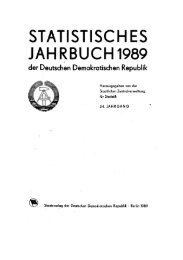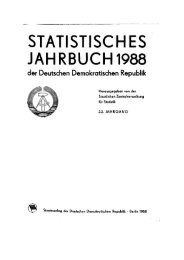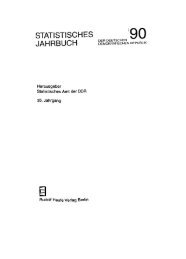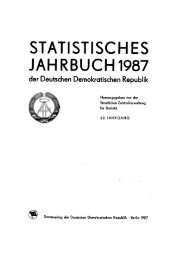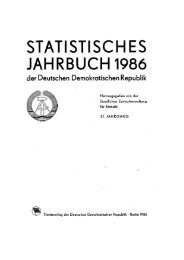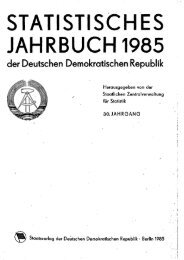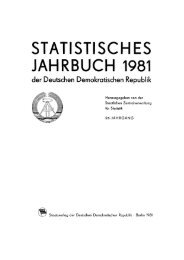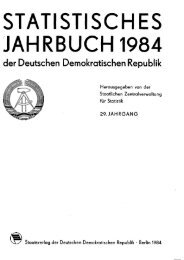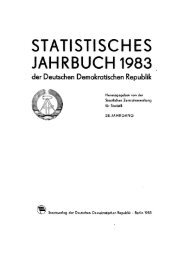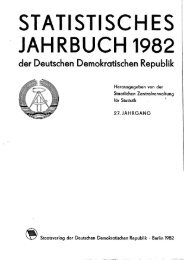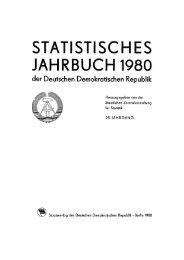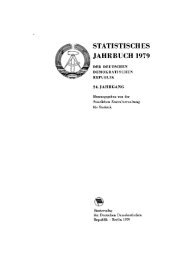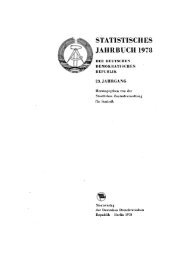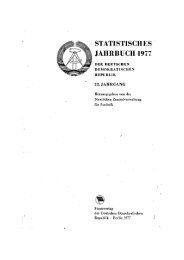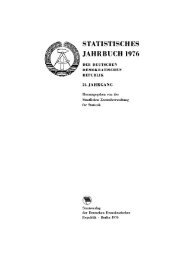- Page 1 and 2:
2001 YEAR BOOK AUSTRALIA
- Page 5:
2001 YEAR BOOK AUSTRALIA This editi
- Page 8 and 9:
ISSN 0312-4746 © Commonwealth of A
- Page 10 and 11:
14 Environment 577 15 Agriculture 6
- Page 13 and 14:
Year Book Australia 2001 ix Year Bo
- Page 31 and 32:
Year Book Australia 2001 xxvii The
- Page 33 and 34:
Year Book Australia 2001 xxix Thing
- Page 35 and 36:
Year Book Australia 2001 xxxi for t
- Page 37 and 38:
Year Book Australia 2001 xxxiii ind
- Page 39 and 40:
Year Book Australia 2001 xxxv facil
- Page 41 and 42:
Year Book Australia 2001 xxxvii suc
- Page 43 and 44:
Year Book Australia 2001 xxxix stat
- Page 45:
1 Geography and climate Introductio
- Page 48 and 49:
4 Year Book Australia 2001 Landform
- Page 50 and 51:
6 Year Book Australia 2001 Today a
- Page 52 and 53:
8 Year Book Australia 2001 zone, re
- Page 54 and 55:
10 Year Book Australia 2001 1.6 MON
- Page 56 and 57:
12 Year Book Australia 2001 1.7 HIG
- Page 58 and 59:
14 Year Book Australia 2001 Extreme
- Page 60 and 61:
16 Year Book Australia 2001 have a
- Page 62 and 63:
18 Year Book Australia 2001 The ava
- Page 64 and 65:
20 Year Book Australia 2001 1.15 SU
- Page 66 and 67:
22 Year Book Australia 2001 A hundr
- Page 68 and 69:
24 Year Book Australia 2001 Austral
- Page 70 and 71:
26 Year Book Australia 2001 Austral
- Page 72 and 73:
28 Year Book Australia 2001 Meteoro
- Page 74 and 75:
30 Year Book Australia 2001 The arr
- Page 76 and 77:
32 Year Book Australia 2001 Flood w
- Page 78 and 79:
34 Year Book Australia 2001 Commonw
- Page 80 and 81:
36 Year Book Australia 2001 Researc
- Page 82 and 83:
38 Year Book Australia 2001 The map
- Page 84 and 85:
40 Year Book Australia 2001 Tempera
- Page 86 and 87:
42 Year Book Australia 2001 The los
- Page 88 and 89:
44 Year Book Australia 2001 Black F
- Page 90 and 91:
46 Year Book Australia 2001 Brisban
- Page 92 and 93:
48 Year Book Australia 2001 A centu
- Page 94 and 95:
50 Year Book Australia 2001 Referen
- Page 96 and 97:
Political parties 69 The party syst
- Page 98 and 99:
54 Year Book Australia 2001 New Gui
- Page 100 and 101:
56 Year Book Australia 2001 2.1 VOT
- Page 102 and 103:
58 Year Book Australia 2001 The pow
- Page 104 and 105:
60 Year Book Australia 2001 2.2 COM
- Page 106 and 107:
62 Year Book Australia 2001 Commonw
- Page 108 and 109:
64 Year Book Australia 2001 2.6 COM
- Page 110 and 111:
66 Year Book Australia 2001 2.9 GOV
- Page 112 and 113:
68 Year Book Australia 2001 Territo
- Page 114 and 115:
70 Year Book Australia 2001 (c) tha
- Page 116 and 117:
72 Year Book Australia 2001 Women a
- Page 118 and 119:
74 Year Book Australia 2001 In 1911
- Page 120 and 121:
76 Year Book Australia 2001 C3.2 WO
- Page 122 and 123:
78 Year Book Australia 2001 C3.7 CO
- Page 124 and 125:
80 Year Book Australia 2001 Austral
- Page 126 and 127:
82 Year Book Australia 2001 C3.9 FE
- Page 128 and 129:
84 Year Book Australia 2001 C3.12 W
- Page 130 and 131:
86 Year Book Australia 2001 the new
- Page 132 and 133:
88 Year Book Australia 2001 there i
- Page 135 and 136:
3 International relations Introduct
- Page 137 and 138:
Chapter 3—International relations
- Page 139 and 140:
Chapter 3—International relations
- Page 141 and 142:
Chapter 3—International relations
- Page 143 and 144:
Chapter 3—International relations
- Page 145 and 146:
Chapter 3—International relations
- Page 147 and 148:
Chapter 3—International relations
- Page 149 and 150:
Chapter 3—International relations
- Page 151 and 152:
Chapter 3—International relations
- Page 153 and 154:
Chapter 3—International relations
- Page 155 and 156:
Chapter 3—International relations
- Page 157 and 158:
Chapter 3—International relations
- Page 159:
4 Defence Introduction 117 Australi
- Page 162 and 163:
118 Year Book Australia 2001 Evolut
- Page 164 and 165:
120 Year Book Australia 2001 4.1 DE
- Page 166 and 167:
122 Year Book Australia 2001 Defenc
- Page 168 and 169:
124 Year Book Australia 2001 4.8 DE
- Page 170 and 171:
126 Year Book Australia 2001 Biblio
- Page 173 and 174:
Chapter 5—Population 129 Introduc
- Page 175 and 176:
Chapter 5—Population 131 5.1 ESTI
- Page 177 and 178:
Chapter 5—Population 133 Million
- Page 179 and 180:
Chapter 5—Population 135 5.8 ESTI
- Page 181 and 182:
Chapter 5—Population 137 2008-09,
- Page 183 and 184:
Chapter 5—Population 139 5.14 POP
- Page 185 and 186:
Chapter 5—Population 141 5.16 EST
- Page 187 and 188:
Chapter 5—Population 143 5.19 RUR
- Page 189 and 190:
Chapter 5—Population 145 0-14 yea
- Page 191 and 192:
Chapter 5—Population 147 Deaths I
- Page 193 and 194:
Chapter 5—Population 149 5.28 SEL
- Page 195 and 196:
Chapter 5—Population 151 5.31 SET
- Page 197 and 198:
Chapter 5—Population 153 5.35 FIR
- Page 199 and 200:
Chapter 5—Population 155 5.39 SEL
- Page 201 and 202:
Chapter 5—Population 157 5.42 CRU
- Page 203 and 204:
Chapter 5—Population 159 Series A
- Page 205 and 206:
Chapter 5—Population 161 immigrat
- Page 207 and 208:
Chapter 5—Population 163 Separati
- Page 209 and 210:
Chapter 5—Population 165 Western
- Page 211 and 212:
Chapter 5—Population 167 Bibliogr
- Page 213 and 214:
Chapter 5—Population 169 A centur
- Page 215 and 216:
Chapter 5—Population 171 C4.3 POP
- Page 217 and 218:
Chapter 5—Population 173 C4.6 CUM
- Page 219 and 220:
Chapter 5—Population 175 C4.9 TOT
- Page 221 and 222:
Chapter 5—Population 177 '000 100
- Page 223 and 224:
Chapter 5—Population 179 C4.15 SE
- Page 225 and 226:
Chapter 5—Population 181 C4.18a T
- Page 227 and 228:
Chapter 5—Population 183 It could
- Page 229 and 230:
Chapter 5—Population 185 C4.20c L
- Page 231 and 232:
Chapter 5—Population 187 C4.23 PE
- Page 233 and 234:
Chapter 5—Population 189 Age and
- Page 235 and 236:
Chapter 5—Population 191 The prop
- Page 237 and 238:
Chapter 5—Population 193 C4.32 GR
- Page 239 and 240:
Chapter 5—Population 195 C4.34 PE
- Page 241 and 242:
Chapter 5—Population 197 The Indi
- Page 243 and 244:
Chapter 5—Population 199 C4.39 WE
- Page 245 and 246:
Chapter 5—Population 201 C4.40b P
- Page 247 and 248:
Chapter 5—Population 203 C4.42 UR
- Page 249 and 250:
Chapter 5—Population 205 Overall,
- Page 251 and 252:
Chapter 5—Population 207 Endnotes
- Page 253 and 254:
Chapter 5—Population 209 Glover,
- Page 255:
6 Labour Introduction 213 Labour ma
- Page 258 and 259:
214 Year Book Australia 2001 6.1 TH
- Page 260 and 261:
216 Year Book Australia 2001 6.3 LA
- Page 262 and 263:
218 Year Book Australia 2001 Table
- Page 264 and 265:
220 Year Book Australia 2001 Person
- Page 266 and 267:
222 Year Book Australia 2001 Undere
- Page 268 and 269:
224 Year Book Australia 2001 Males
- Page 270 and 271:
226 Year Book Australia 2001 6.17 U
- Page 272 and 273:
228 Year Book Australia 2001 Person
- Page 274 and 275:
230 Year Book Australia 2001 6.23 E
- Page 276 and 277:
232 Year Book Australia 2001 6.27 M
- Page 278 and 279:
234 Year Book Australia 2001 The qu
- Page 280 and 281:
236 Year Book Australia 2001 6.32 A
- Page 282 and 283:
238 Year Book Australia 2001 6.34 T
- Page 284 and 285:
240 Year Book Australia 2001 The ma
- Page 286 and 287:
242 Year Book Australia 2001 Trade
- Page 288 and 289:
244 Year Book Australia 2001 6.44 U
- Page 290 and 291:
246 Year Book Australia 2001 Althou
- Page 293 and 294:
7 Income and welfare Introduction 2
- Page 295 and 296:
Chapter 7—Income and welfare 251
- Page 297 and 298:
Chapter 7—Income and welfare 253
- Page 299 and 300:
Chapter 7—Income and welfare 255
- Page 301 and 302:
Chapter 7—Income and welfare 257
- Page 303 and 304:
Chapter 7—Income and welfare 259
- Page 305 and 306:
Chapter 7—Income and welfare 261
- Page 307 and 308:
Chapter 7—Income and welfare 263
- Page 309 and 310:
Chapter 7—Income and welfare 265
- Page 311 and 312:
Chapter 7—Income and welfare 267
- Page 313 and 314:
Chapter 7—Income and welfare 269
- Page 315 and 316:
Chapter 7—Income and welfare 271
- Page 317 and 318:
Chapter 7—Income and welfare 273
- Page 319 and 320:
Chapter 7—Income and welfare 275
- Page 321 and 322:
Chapter 7—Income and welfare 277
- Page 323 and 324:
Chapter 7—Income and welfare 279
- Page 325 and 326:
Chapter 7—Income and welfare 281
- Page 327 and 328:
Chapter 7—Income and welfare 283
- Page 329 and 330:
Chapter 7—Income and welfare 285
- Page 331 and 332:
Chapter 7—Income and welfare 287
- Page 333 and 334:
Chapter 7—Income and welfare 289
- Page 335 and 336:
Chapter 7—Income and welfare 291
- Page 337 and 338:
Chapter 7—Income and welfare 293
- Page 339:
Chapter 7—Income and welfare 295
- Page 343 and 344:
Chapter 8—Housing 299 Introductio
- Page 345 and 346:
Chapter 8—Housing 301 8.3 DWELLIN
- Page 347 and 348:
Chapter 8—Housing 303 8.6 NUMBER
- Page 349 and 350:
Chapter 8—Housing 305 Home owners
- Page 351 and 352:
Chapter 8—Housing 307 For many ho
- Page 353 and 354:
Chapter 8—Housing 309 Young singl
- Page 355 and 356:
Chapter 8—Housing 311 Capital cit
- Page 357 and 358:
Chapter 8—Housing 313 Banks conti
- Page 359 and 360:
Chapter 8—Housing 315 Home purcha
- Page 361 and 362:
Chapter 8—Housing 317 assistance,
- Page 363 and 364:
Chapter 8—Housing 319 Dwellings a
- Page 365 and 366:
Chapter 8—Housing 321 8.22 HOUSIN
- Page 367:
Chapter 8—Housing 323 Bibliograph
- Page 370 and 371:
Private health insurance 358 Health
- Page 372 and 373:
328 Year Book Australia 2001 Health
- Page 374 and 375:
330 Year Book Australia 2001 % 100
- Page 376 and 377:
332 Year Book Australia 2001 9.6 AG
- Page 378 and 379:
334 Year Book Australia 2001 Nation
- Page 380 and 381:
336 Year Book Australia 2001 9.11 D
- Page 382 and 383:
338 Year Book Australia 2001 9.13 M
- Page 384 and 385:
340 Year Book Australia 2001 Diabet
- Page 386 and 387:
342 Year Book Australia 2001 who di
- Page 388 and 389:
344 Year Book Australia 2001 % 21 1
- Page 390 and 391:
346 Year Book Australia 2001 north
- Page 392 and 393:
348 Year Book Australia 2001 Childr
- Page 394 and 395:
350 Year Book Australia 2001 Fruit
- Page 396 and 397:
352 Year Book Australia 2001 Combin
- Page 398 and 399:
354 Year Book Australia 2001 from 1
- Page 400 and 401:
356 Year Book Australia 2001 9.35 P
- Page 402 and 403:
358 Year Book Australia 2001 9.36 P
- Page 404 and 405:
360 Year Book Australia 2001 9.37 E
- Page 406 and 407:
362 Year Book Australia 2001 Commun
- Page 408 and 409:
364 Year Book Australia 2001 contro
- Page 410 and 411:
366 Year Book Australia 2001 —200
- Page 412 and 413:
368 Year Book Australia 2001 Child
- Page 414 and 415:
370 Year Book Australia 2001 Child
- Page 416 and 417:
372 Year Book Australia 2001 Rate(a
- Page 418 and 419:
374 Year Book Australia 2001 0to4 5
- Page 420 and 421:
376 Year Book Australia 2001 Reason
- Page 422 and 423:
378 Year Book Australia 2001 Fertil
- Page 424 and 425:
380 Year Book Australia 2001 C6.13
- Page 426 and 427:
382 Year Book Australia 2001 C6.15
- Page 428 and 429:
384 Year Book Australia 2001 C6.19
- Page 430 and 431:
386 Year Book Australia 2001 C6.21a
- Page 432 and 433:
388 Year Book Australia 2001 Austra
- Page 434 and 435:
390 Year Book Australia 2001 and to
- Page 436 and 437:
392 Year Book Australia 2001 The sp
- Page 438 and 439:
394 Year Book Australia 2001 Cumpst
- Page 440 and 441:
396 Year Book Australia 2001 The Co
- Page 442 and 443:
398 Year Book Australia 2001 —Soc
- Page 444 and 445:
400 Year Book Australia 2001 Wake,
- Page 446 and 447:
Indigenous education 421 Indigenous
- Page 448 and 449:
404 Year Book Australia 2001 instit
- Page 450 and 451:
406 Year Book Australia 2001 10.2 S
- Page 452 and 453:
408 Year Book Australia 2001 % 100
- Page 454 and 455:
410 Year Book Australia 2001 Adelai
- Page 456 and 457:
412 Year Book Australia 2001 3.4 al
- Page 458 and 459:
414 Year Book Australia 2001 10.9 H
- Page 460 and 461:
416 Year Book Australia 2001 10.13
- Page 462 and 463:
418 Year Book Australia 2001 10.15
- Page 464 and 465:
420 Year Book Australia 2001 10.18
- Page 466 and 467:
422 Year Book Australia 2001 10.22
- Page 468 and 469:
424 Year Book Australia 2001 10.24
- Page 470 and 471:
426 Year Book Australia 2001 1901,
- Page 472 and 473:
428 Year Book Australia 2001 2001 C
- Page 474 and 475:
430 Year Book Australia 2001 10.30
- Page 476 and 477:
432 Year Book Australia 2001 Minist
- Page 478 and 479:
434 Year Book Australia 2001 not st
- Page 480 and 481:
436 Year Book Australia 2001 work,
- Page 482 and 483:
438 Year Book Australia 2001 funded
- Page 484 and 485:
440 Year Book Australia 2001 Over 6
- Page 486 and 487:
442 Year Book Australia 2001 C7.5 R
- Page 488 and 489:
444 Year Book Australia 2001 subsid
- Page 490 and 491:
446 Year Book Australia 2001 C7.8 E
- Page 493 and 494:
Chapter 11—Crime and justice 449
- Page 495 and 496:
Chapter 11—Crime and justice 451
- Page 497 and 498:
Chapter 11—Crime and justice 453
- Page 499 and 500:
Chapter 11—Crime and justice 455
- Page 501 and 502:
Chapter 11—Crime and justice 457
- Page 503 and 504:
Chapter 11—Crime and justice 459
- Page 505 and 506:
Chapter 11—Crime and justice 461
- Page 507 and 508:
Chapter 11—Crime and justice 463
- Page 509 and 510:
Chapter 11—Crime and justice 465
- Page 511 and 512:
Chapter 11—Crime and justice 467
- Page 513 and 514:
Chapter 11—Crime and justice 469
- Page 515 and 516:
Chapter 11—Crime and justice 471
- Page 517 and 518:
Chapter 11—Crime and justice 473
- Page 519 and 520:
Chapter 11—Crime and justice 475
- Page 521 and 522:
Chapter 11—Crime and justice 477
- Page 523 and 524:
Chapter 11—Crime and justice 479
- Page 525 and 526:
Chapter 11—Crime and justice 481
- Page 527 and 528:
Chapter 11—Crime and justice 483
- Page 529 and 530:
Chapter 11—Crime and justice 485
- Page 531 and 532:
Chapter 11—Crime and justice 487
- Page 533 and 534:
Chapter 11—Crime and justice 489
- Page 535 and 536:
Chapter 11—Crime and justice 491
- Page 537 and 538:
Chapter 11—Crime and justice 493
- Page 539:
Chapter 11—Crime and justice 495
- Page 542 and 543:
Film and video distribution 513 Mot
- Page 544 and 545:
500 Year Book Australia 2001 railwa
- Page 546 and 547:
502 Year Book Australia 2001 Memori
- Page 548 and 549:
504 Year Book Australia 2001 12.6 A
- Page 550 and 551:
506 Year Book Australia 2001 docume
- Page 552 and 553:
508 Year Book Australia 2001 Archiv
- Page 554 and 555:
510 Year Book Australia 2001 12.15
- Page 556 and 557:
512 Year Book Australia 2001 12.19
- Page 558 and 559:
514 Year Book Australia 2001 Multim
- Page 560 and 561:
516 Year Book Australia 2001 Asia-P
- Page 562 and 563:
518 Year Book Australia 2001 the na
- Page 564 and 565:
520 Year Book Australia 2001 12.24
- Page 566 and 567:
522 Year Book Australia 2001 12.28
- Page 568 and 569:
524 Year Book Australia 2001 Certai
- Page 570 and 571:
526 Year Book Australia 2001 workin
- Page 572 and 573:
528 Year Book Australia 2001 12.29
- Page 574 and 575:
530 Year Book Australia 2001 aerobi
- Page 576 and 577:
532 Year Book Australia 2001 Biblio
- Page 578 and 579:
534 Year Book Australia 2001 Accoun
- Page 580 and 581:
536 Year Book Australia 2001 the su
- Page 582 and 583:
538 Year Book Australia 2001 museum
- Page 584 and 585:
540 Year Book Australia 2001 twenti
- Page 586 and 587:
542 Year Book Australia 2001 Indige
- Page 588 and 589:
544 Year Book Australia 2001 desire
- Page 590 and 591:
546 Year Book Australia 2001 Museum
- Page 592 and 593:
548 Year Book Australia 2001 Public
- Page 594 and 595:
550 Year Book Australia 2001 galler
- Page 596 and 597:
552 Year Book Australia 2001 tribut
- Page 598 and 599:
554 Year Book Australia 2001 earlie
- Page 600 and 601:
556 Year Book Australia 2001 Ration
- Page 602 and 603:
558 Year Book Australia 2001 within
- Page 604 and 605:
560 Year Book Australia 2001 5 Thes
- Page 607:
13 Industry overview Introduction 5
- Page 610 and 611:
566 Year Book Australia 2001 Measur
- Page 612 and 613:
568 Year Book Australia 2001 Table
- Page 614 and 615:
570 Year Book Australia 2001 indust
- Page 616 and 617:
572 Year Book Australia 2001 Change
- Page 618 and 619:
574 Year Book Australia 2001 Chapte
- Page 621:
14 Environment Introduction 579 Env
- Page 624 and 625:
580 Year Book Australia 2001 Graph
- Page 626 and 627:
582 Year Book Australia 2001 % 100
- Page 628 and 629:
584 Year Book Australia 2001 14.9 C
- Page 630 and 631:
586 Year Book Australia 2001 The fo
- Page 632 and 633:
588 Year Book Australia 2001 Climat
- Page 634 and 635:
590 Year Book Australia 2001 Among
- Page 636 and 637:
592 Year Book Australia 2001 As Aus
- Page 638 and 639:
594 Year Book Australia 2001 14.24
- Page 640 and 641:
596 Year Book Australia 2001 the ba
- Page 642 and 643:
598 Year Book Australia 2001 The fu
- Page 644 and 645:
600 Year Book Australia 2001 One of
- Page 646 and 647:
602 Year Book Australia 2001 The Au
- Page 648 and 649:
604 Year Book Australia 2001 Local
- Page 650 and 651:
606 Year Book Australia 2001 Cooper
- Page 652 and 653:
608 Year Book Australia 2001 OECD,
- Page 654 and 655:
Meat production and slaughtering 64
- Page 656 and 657:
612 Year Book Australia 2001 § Lan
- Page 658 and 659:
614 Year Book Australia 2001 § Rel
- Page 660 and 661:
616 Year Book Australia 2001 also a
- Page 662 and 663:
618 Year Book Australia 2001 15.2 A
- Page 664 and 665:
620 Year Book Australia 2001 Commod
- Page 666 and 667:
622 Year Book Australia 2001 Financ
- Page 668 and 669:
624 Year Book Australia 2001 15.12
- Page 670 and 671:
626 Year Book Australia 2001 15.15
- Page 672 and 673:
628 Year Book Australia 2001 Oats O
- Page 674 and 675:
630 Year Book Australia 2001 Barley
- Page 676 and 677:
632 Year Book Australia 2001 15.24
- Page 678 and 679:
634 Year Book Australia 2001 15.29
- Page 680 and 681:
636 Year Book Australia 2001 Area h
- Page 682 and 683:
638 Year Book Australia 2001 15.38
- Page 684 and 685:
640 Year Book Australia 2001 15.41
- Page 686 and 687:
642 Year Book Australia 2001 Signif
- Page 688 and 689:
644 Year Book Australia 2001 The re
- Page 690 and 691:
646 Year Book Australia 2001 Appare
- Page 693 and 694:
16 Forestry and fishing Introductio
- Page 695 and 696:
Chapter 16—Forestry and fishing 6
- Page 697 and 698:
Chapter 16—Forestry and fishing 6
- Page 699 and 700:
Chapter 16—Forestry and fishing 6
- Page 701 and 702:
Chapter 16—Forestry and fishing 6
- Page 703 and 704:
Chapter 16—Forestry and fishing 6
- Page 705 and 706:
Chapter 16—Forestry and fishing 6
- Page 707 and 708:
Chapter 16—Forestry and fishing 6
- Page 709 and 710:
Chapter 16—Forestry and fishing 6
- Page 711 and 712:
Chapter 16—Forestry and fishing 6
- Page 713 and 714:
17 Mining Introduction 671 Article
- Page 715 and 716:
Chapter 17—Mining 671 Introductio
- Page 717 and 718:
Chapter 17—Mining 673 opened. Aus
- Page 719 and 720:
Chapter 17—Mining 675 Over 60% of
- Page 721 and 722:
Chapter 17—Mining 677 Turnover in
- Page 723 and 724:
Chapter 17—Mining 679 17.4 MINERA
- Page 725 and 726:
Chapter 17—Mining 681 Iron ore Re
- Page 727 and 728:
Chapter 17—Mining 683 Liquefied p
- Page 729 and 730:
Chapter 17—Mining 685 17.6 PRIVAT
- Page 731 and 732:
Chapter 17—Mining 687 Australian
- Page 733:
Chapter 17—Mining 689 Bibliograph
- Page 737 and 738:
Chapter 18—Energy 693 Introductio
- Page 739 and 740:
Chapter 18—Energy 695 18.3 ENERGY
- Page 741 and 742:
Chapter 18—Energy 697 18.6 AUSTRA
- Page 743 and 744:
Chapter 18—Energy 699 Black coal
- Page 745 and 746:
Chapter 18—Energy 701 18.13 TOTAL
- Page 747 and 748:
Chapter 18—Energy 703 In 1996-97
- Page 749 and 750:
Chapter 18—Energy 705 18.18 CARBO
- Page 751 and 752:
Chapter 18—Energy 707 Bibliograph
- Page 753:
19 Manufacturing Introduction 711 A
- Page 756 and 757:
712 Year Book Australia 2001 Depres
- Page 758 and 759:
714 Year Book Australia 2001 countr
- Page 760 and 761:
716 Year Book Australia 2001 19.3 M
- Page 762 and 763:
718 Year Book Australia 2001 Turnov
- Page 764 and 765:
720 Year Book Australia 2001 Trade
- Page 766 and 767:
722 Year Book Australia 2001 Compan
- Page 768 and 769:
724 Year Book Australia 2001 19.17
- Page 770 and 771:
726 Year Book Australia 2001 Overal
- Page 773:
20 Construction Introduction 731 Pe
- Page 776 and 777:
732 Year Book Australia 2001 Select
- Page 778 and 779:
734 Year Book Australia 2001 20.5 T
- Page 780 and 781:
736 Year Book Australia 2001 20.10
- Page 782 and 783:
738 Year Book Australia 2001 The Au
- Page 784 and 785:
740 Year Book Australia 2001 Engine
- Page 786 and 787:
742 Year Book Australia 2001 20.19
- Page 788 and 789:
744 Year Book Australia 2001 20.24
- Page 791 and 792:
21 Service industries Introduction
- Page 793 and 794:
Chapter 21—Service industries 749
- Page 795 and 796:
Chapter 21—Service industries 751
- Page 797 and 798:
Chapter 21—Service industries 753
- Page 799 and 800:
Chapter 21—Service industries 755
- Page 801 and 802:
Chapter 21—Service industries 757
- Page 803 and 804:
Chapter 21—Service industries 759
- Page 805 and 806:
Chapter 21—Service industries 761
- Page 807 and 808:
Chapter 21—Service industries 763
- Page 809 and 810:
Chapter 21—Service industries 765
- Page 811 and 812:
Chapter 21—Service industries 767
- Page 813 and 814:
Chapter 21—Service industries 769
- Page 815 and 816:
Chapter 21—Service industries 771
- Page 817 and 818:
Chapter 21—Service industries 773
- Page 819 and 820:
Chapter 21—Service industries 775
- Page 821 and 822:
Chapter 21—Service industries 777
- Page 823 and 824:
Chapter 21—Service industries 779
- Page 825 and 826:
Chapter 21—Service industries 781
- Page 827:
22 Tourism Introduction 785 Economi
- Page 830 and 831:
786 Year Book Australia 2001 small,
- Page 832 and 833:
788 Year Book Australia 2001 22.4 V
- Page 834 and 835:
790 Year Book Australia 2001 Visito
- Page 836 and 837:
792 Year Book Australia 2001 Inboun
- Page 838 and 839:
794 Year Book Australia 2001 22.14
- Page 840 and 841:
796 Year Book Australia 2001 The mo
- Page 843 and 844:
23 Transport Introduction 801 Trans
- Page 845 and 846:
Chapter 23—Transport 801 Introduc
- Page 847 and 848:
Chapter 23—Transport 803 New Sout
- Page 849 and 850:
Chapter 23—Transport 805 23.8 COA
- Page 851 and 852:
Chapter 23—Transport 807 Domestic
- Page 853 and 854:
Chapter 23—Transport 809 23.16 SC
- Page 855 and 856:
Chapter 23—Transport 811 23.20 RO
- Page 857 and 858:
Chapter 23—Transport 813 Contribu
- Page 859 and 860:
Chapter 23—Transport 815 23.25 LE
- Page 861 and 862:
Chapter 23—Transport 817 23.30 MO
- Page 863 and 864:
Chapter 23—Transport 819 23.34 SH
- Page 865 and 866:
Chapter 23—Transport 821 and Niss
- Page 867 and 868:
Chapter 23—Transport 823 The comp
- Page 869:
Chapter 23—Transport 825 Bibliogr
- Page 873 and 874:
Chapter 24—Communications and inf
- Page 875 and 876:
Chapter 24—Communications and inf
- Page 877 and 878:
Chapter 24—Communications and inf
- Page 879 and 880:
Chapter 24—Communications and inf
- Page 881 and 882:
Chapter 24—Communications and inf
- Page 883 and 884:
Chapter 24—Communications and inf
- Page 885 and 886:
Chapter 24—Communications and inf
- Page 887 and 888:
Chapter 24—Communications and inf
- Page 889:
Chapter 24—Communications and inf
- Page 893 and 894:
Chapter 25—Science and innovation
- Page 895 and 896:
Chapter 25—Science and innovation
- Page 897 and 898:
Chapter 25—Science and innovation
- Page 899 and 900:
Chapter 25—Science and innovation
- Page 901 and 902:
Chapter 25—Science and innovation
- Page 903 and 904:
Chapter 25—Science and innovation
- Page 905 and 906:
Chapter 25—Science and innovation
- Page 907 and 908:
Chapter 25—Science and innovation
- Page 909 and 910:
Chapter 25—Science and innovation
- Page 911 and 912:
Chapter 25—Science and innovation
- Page 913 and 914:
Chapter 25—Science and innovation
- Page 915 and 916:
Chapter 25—Science and innovation
- Page 917 and 918:
Chapter 25—Science and innovation
- Page 919 and 920:
Chapter 25—Science and innovation
- Page 921 and 922:
Chapter 25—Science and innovation
- Page 923:
Chapter 25—Science and innovation
- Page 927 and 928:
Chapter 26—Financial system 883 I
- Page 929 and 930: Chapter 26—Financial system 885 c
- Page 931 and 932: Chapter 26—Financial system 887 2
- Page 933 and 934: Chapter 26—Financial system 889 C
- Page 935 and 936: Chapter 26—Financial system 891 2
- Page 937 and 938: Chapter 26—Financial system 893 F
- Page 939 and 940: Chapter 26—Financial system 895 M
- Page 941 and 942: Chapter 26—Financial system 897 2
- Page 943 and 944: Chapter 26—Financial system 899 2
- Page 945 and 946: Chapter 26—Financial system 901 I
- Page 947 and 948: Chapter 26—Financial system 903 2
- Page 949 and 950: Chapter 26—Financial system 905 A
- Page 951 and 952: Chapter 26—Financial system 907 R
- Page 953 and 954: Chapter 26—Financial system 909 2
- Page 955 and 956: Chapter 26—Financial system 911 2
- Page 957: Chapter 26—Financial system 913 B
- Page 961 and 962: Chapter 27—Government finance 917
- Page 963 and 964: Chapter 27—Government finance 919
- Page 965 and 966: Chapter 27—Government finance 921
- Page 967 and 968: Chapter 27—Government finance 923
- Page 969 and 970: Chapter 27—Government finance 925
- Page 971 and 972: Chapter 27—Government finance 927
- Page 973 and 974: Chapter 27—Government finance 929
- Page 975 and 976: Chapter 27—Government finance 931
- Page 977 and 978: Chapter 27—Government finance 933
- Page 979: Chapter 27—Government finance 935
- Page 983 and 984: Chapter 27—Government finance 939
- Page 985: Chapter 27—Government finance 941
- Page 989 and 990: Chapter 28—Prices 945 Introductio
- Page 991 and 992: Chapter 28—Prices 947 28.1 CONSUM
- Page 993 and 994: Chapter 28—Prices 949 Year 28.3 C
- Page 995 and 996: Chapter 28—Prices 951 28.6 CONSUM
- Page 997 and 998: Chapter 28—Prices 953 28.7 Wages
- Page 999 and 1000: Chapter 28—Prices 955 Price index
- Page 1001 and 1002: Chapter 28—Prices 957 Manufacturi
- Page 1003 and 1004: Chapter 28—Prices 959 28.13 PRODU
- Page 1005 and 1006: Chapter 28—Prices 961 28.15 INTER
- Page 1007 and 1008: Chapter 28—Prices 963 Sep 1998 28
- Page 1009: Chapter 28—Prices 965 Other publi
- Page 1013 and 1014: Chapter 29—National accounts 969
- Page 1015 and 1016: Chapter 29—National accounts 971
- Page 1017 and 1018: Chapter 29—National accounts 973
- Page 1019 and 1020: Chapter 29—National accounts 975
- Page 1021 and 1022: Chapter 29—National accounts 977
- Page 1023 and 1024: Chapter 29—National accounts 979
- Page 1025 and 1026: Chapter 29—National accounts 981
- Page 1027 and 1028: Chapter 29—National accounts 983
- Page 1029 and 1030: Chapter 29—National accounts 985
- Page 1031 and 1032:
Chapter 29—National accounts 987
- Page 1033 and 1034:
Chapter 29—National accounts 989
- Page 1035 and 1036:
Chapter 29—National accounts 991
- Page 1037 and 1038:
Chapter 29—National accounts 993
- Page 1039 and 1040:
Chapter 29—National accounts 995
- Page 1041:
30 International accounts and trade
- Page 1044 and 1045:
1000 Year Book Australia 2001 30.1
- Page 1046 and 1047:
1002 Year Book Australia 2001 earne
- Page 1048 and 1049:
1004 Year Book Australia 2001 30.2
- Page 1050 and 1051:
1006 Year Book Australia 2001 Inter
- Page 1052 and 1053:
1008 Year Book Australia 2001 30.6
- Page 1054 and 1055:
1010 Year Book Australia 2001 30.7
- Page 1056 and 1057:
1012 Year Book Australia 2001 30.9
- Page 1058 and 1059:
1014 Year Book Australia 2001 A cen
- Page 1060 and 1061:
1016 Year Book Australia 2001 Inter
- Page 1062 and 1063:
1018 Year Book Australia 2001 Forei
- Page 1064 and 1065:
1020 Year Book Australia 2001 30.15
- Page 1066 and 1067:
1022 Year Book Australia 2001 Endno
- Page 1068 and 1069:
1024 Year Book Australia 2001 Altho
- Page 1070 and 1071:
1026 Year Book Australia 2001 Total
- Page 1072 and 1073:
1028 Year Book Australia 2001 30.26
- Page 1074 and 1075:
1030 Year Book Australia 2001 30.26
- Page 1076 and 1077:
1032 Year Book Australia 2001 Merch
- Page 1078 and 1079:
1034 Year Book Australia 2001 30.28
- Page 1080 and 1081:
1036 Year Book Australia 2001 The l
- Page 1082 and 1083:
1038 Year Book Australia 2001 Modes
- Page 1084 and 1085:
1040 Year Book Australia 2001 30.32
- Page 1087 and 1088:
Year Book Australia 2000 1043 List
- Page 1089 and 1090:
Year Book Australia 2001 1045 Ackno
- Page 1091:
Year Book Australia 2001 1047 Dr An
- Page 1095 and 1096:
Year Book Australia 2001 1051 Index
- Page 1097 and 1098:
Year Book Australia 2001 1053 motor
- Page 1099 and 1100:
Year Book Australia 2001 1055 Austr
- Page 1101 and 1102:
Year Book Australia 2001 1057 busin
- Page 1103 and 1104:
Year Book Australia 2001 1059 coast
- Page 1105 and 1106:
Year Book Australia 2001 1061 crowd
- Page 1107 and 1108:
Year Book Australia 2001 1063 Dwyer
- Page 1109 and 1110:
Year Book Australia 2001 1065 field
- Page 1111 and 1112:
Year Book Australia 2001 1067 gover
- Page 1113 and 1114:
Year Book Australia 2001 1069 elect
- Page 1115 and 1116:
Year Book Australia 2001 1071 input
- Page 1117 and 1118:
Year Book Australia 2001 1073 leisu
- Page 1119 and 1120:
Year Book Australia 2001 1075 Milit
- Page 1121 and 1122:
Year Book Australia 2001 1077 natur
- Page 1123 and 1124:
Year Book Australia 2001 1079 Partn
- Page 1125 and 1126:
Year Book Australia 2001 1081 taxes
- Page 1127 and 1128:
Year Book Australia 2001 1083 rice
- Page 1129 and 1130:
Year Book Australia 2001 1085 sight
- Page 1131 and 1132:
Year Book Australia 2001 1087 pensi
- Page 1133 and 1134:
Year Book Australia 2001 1089 unemp
- Page 1135:
Year Book Australia 2001 1091 WoolS



